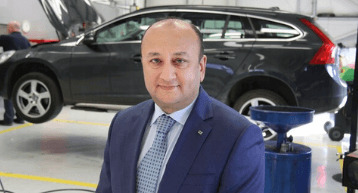Marshall Motor Holdings reported revenues down by 5.3% to £2.15 billion as pre-tax profits rose 3.7% to £20.4 million in a COVID-19 impacted 2020 car retail market.
Full-year financial results for the 12 month period to December 31, 2020, revealed this morning that the AM100 PLC had retained its financial resilience with the help of Government support as its underlying basis as revenues declined 13.5% (to £1.87bn), alongside pre-tax profits down 5.4% (to £20.9m) on an underlying basis.
Group chief executive, Daksh Gupta, credited Marshall’s 4,300-strong workforce and a rapid shift to digital retail for what he described as an “outstanding” response from the business in unprecedented times.
Speaking to AM this morning, he said: “You have to acknowledge that effort. Looking at our KPIs, our guys absolutely smashed it out of the park in 2020.
“When you’re double digits ahead of the new car market, up 8% in fleet and you’re delivering strong aftersales performance, as we did, you have to give credit where credit’s due.
“However, we have to keep our feet on the ground and acknowledge that we were in receipt of considerable government support, which we were humbled by, and other help in periods of lengthy lockdown.
“Let’s not forget that these results were delivered in a lockdown that was tough for a lot of people.”
Sales and support
Marshall’s total new sales volumes were down 9.2% (27,913 retail and 15,021 fleet) in the reported period, with like-for-like total new vehicle unit sales down 19.4%, in an outperformance of a UK market down 29.4%.
Its total used vehicle unit sales were down 5.3% (44,505) with like-for-like unit sales down 14.6%, compared with used vehicle transactions down 14.9%, meanwhile.
Total revenues from aftersales were down 5.2%, with like-for-like revenue down 13.5%.
Marshall revealed that it kept 62 of its aftersales operations open across the country during H1 2020’s first COVID-19 lockdown period to support the emergency services, vulnerable customers and key workers.
During the closure period, to June 2020, the group took orders for over 3,700 new and used vehicle, significantly down on a prior year which generated over 19,000 new and used vehicle orders.
In a candid interview at AM Live Virtual, Gupta said that he was proud of the action taken by the group to pre-empt Prime Minister Boris Johnson’s lockdown decision in recognition of the risk posed by the virus to both its staff and customers.
Taking advantage of Government’s Coronavirus Job Retention Scheme (CJRS), Marshall furloughed around 90% of its 4,300 colleagues during the H1 lockdown, while taking steps to enhance colleague pay to 100% for March, 90% for April and 85% for May and not imposing the CJRS cap of £2,500 per month.
As announced in October 2020, the benefitted from pent-up demand following the first lockdown and enjoyed a "stunning" plate-change month of September.
Against the SMMT-reported decline in total new vehicle registrations in September 2020 of 4.4%, the Group’s like-for-like total new vehicle sales were up 18.4%.
Across the third quarter of the Year as a whole, the Group’s total new unit sales were up 11.8% on a like-for-like basis compared with SMMT-reported new vehicle registrations down 0.5%.
Still 'acquisitive'
Despite the impact of lockdowns in H1 2020 and November, Marshall was able to leverage that performance to emerge from 2020 with a strong balance sheet.
It reported adjusted net cash at December 31, 2020, of £28.8m, a year-on-year increase of £59.4m.
Like fellow AM100 PLC Vertu Motors, which issued a 2020 trading update last week, Marshall is not proposing a final dividend for shareholders, having suspended payment throughout 2020.
Chief financial officer, Richard Blumberger, told AM that the group’s financial position ensured that it remained in an “acquisitive position”.
Despite the pandemic, Marshall continued to build its retail portfolio last year, adding three further locations with the acquisition of Aylesbury Volkswagen from Jardine Motors Group and new franchised locations for Seat and Cupra in Oxford and Ford Commercial Vehicles in King’s Lynn.
Ongoing portfolio management also brought about the closure of loss-making businesses: Cambridge Hyundai; Bury St Edmunds Ford; Knebworth Vauxhall; and Poole Mercedes-Benz Commercial Vehicles.
In the year ended December 31, 2019, these dealerships made a combined revenue contribution of £47.3m and a loss of £0.1m, it said.
In his chairman’s report, Professor Richard Parry-Jones CBE said that Marshall’s brand partners and suppliers had been “extremely supportive” during 2020.
And he said that “automotive retailers with both scale and a diverse portfolio will be best placed to succeed in a changing market”.
Marshall Motor Holdings now consists of 113 franchises representing 22 brand partners trading in 28 counties nationwide.
In addition, the Group operates six trade parts specialists, two used car centres, six standalone body shops and a pre-delivery inspection (PDI) centre.















Login to comment
Comments
No comments have been made yet.